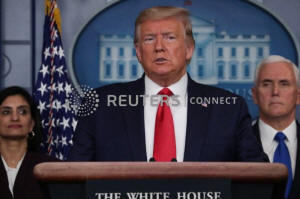Trump ratchets up criticism of China over coronavirus
 Send a link to a friend
Send a link to a friend
 [March 19, 2020]
By Jeff Mason, Matt Spetalnick and Alexandra Alper [March 19, 2020]
By Jeff Mason, Matt Spetalnick and Alexandra Alper
WASHINGTON (Reuters) - U.S. President
Donald Trump on Wednesday ratcheted up his rhetoric against China over
the coronavirus, saying Beijing should have acted faster to warn the
world and dismissing criticism that his labeling it the "Chinese virus"
was racist.
Trump's tougher language marked an escalation in a bitter war of words
between the world's top two economies that has widened to include the
global pandemic and media freedoms.
While Trump had previously left it mostly to his top aides to openly
criticize China's response to the virus, the Republican president joined
the fray in earnest at a White House news conference on Wednesday.
"I don't know if you'd say China's to blame," Trump said. "Certainly we
didn't get an early run on it. It would have been helpful if we had
known about it earlier. But it comes from China, and it's not a question
about that - nobody's questioning that."
Trump, in his opening statement, described what he termed America's "war
against the Chinese virus."

A reporter asked him whether it was wrong and potentially harmful to
Asian-Americans to give the disease that name as well for an unnamed
White House official to have privately termed it the "kung flu," which
has been widely condemned as racist.
"No, not at all. Not at all. I think they probably would agree with it
100 percent," Trump said. "It comes from China, there's nothing not to
agree."
Trump noted that some Chinese officials had tried to blame the virus on
the U.S. military, saying "that can’t happen, it’s not going to happen."
A senior State Department official condemned as "irresponsible" the
Chinese accusation, made last week by a foreign ministry spokesman who
provided no evidence,
Trump's words contrasted sharply with his praise last week for Chinese
President Xi Jinping and China's data sharing about the disease.
Though Trump did not single out Xi for direct criticism, he said the
Chinese government could have given "a lot earlier notice" about the
virus.
The fast-spreading disease that jumped from animals to humans in China
has now infected over 200,000 people and caused nearly 8,500 deaths in
164 nations, triggering emergency lockdowns and injections of cash
unseen since World War Two.
[to top of second column]
|

President Donald Trump addresses the daily coronavirus response
briefing as Seema Verma, administrator of the Centers for Medicare &
Medicaid Services, and Vice President Mike Pence look on at the
White House in Washington, U.S., March 18, 2020. REUTERS/Jonathan
Ernst

In the United States, cases of the respiratory illness have now been
reported in all 50 states, with known U.S. infections surging past
7,300, prompting millions to stay at home and upending American
life. More than a hundred Americans have died from the virus.
Trump also criticized China's decision to withdraw the press
credentials of American journalists at three U.S. newspapers. "I'm
not happy about that at all," he said.
The senior State Department official said there were “lots of
things” the United States could do in response but declined to
specify possible actions.
Beijing announced on Wednesday what it said was retaliation against
U.S. restrictions on Chinese journalists that includes revoking the
accreditations of American correspondents with the New York Times
NYT.N, News Corp's NWSA.O Wall Street Journal and Washington Post
whose credentials expire by the end of 2020.
The move is a sharp escalation of a dispute that saw Washington last
month force Chinese state media firms to register as foreign
embassies.
The episode is the latest in increasing tensions between Washington
and Beijing, whose already strained ties over issues including
trade, intellectual property rights and press freedom have further
been tested by the virus outbreak.
(Reporting by Jeff Mason, Matt Spetalnick, Alexandra Alper and David
Brunnstrom; Writing by Matt Spetalnick; Editing by Tom Brown)
[© 2020 Thomson Reuters. All rights
reserved.] Copyright 2020 Reuters. All rights reserved. This material may not be published,
broadcast, rewritten or redistributed.
Thompson Reuters is solely responsible for this content.
 |